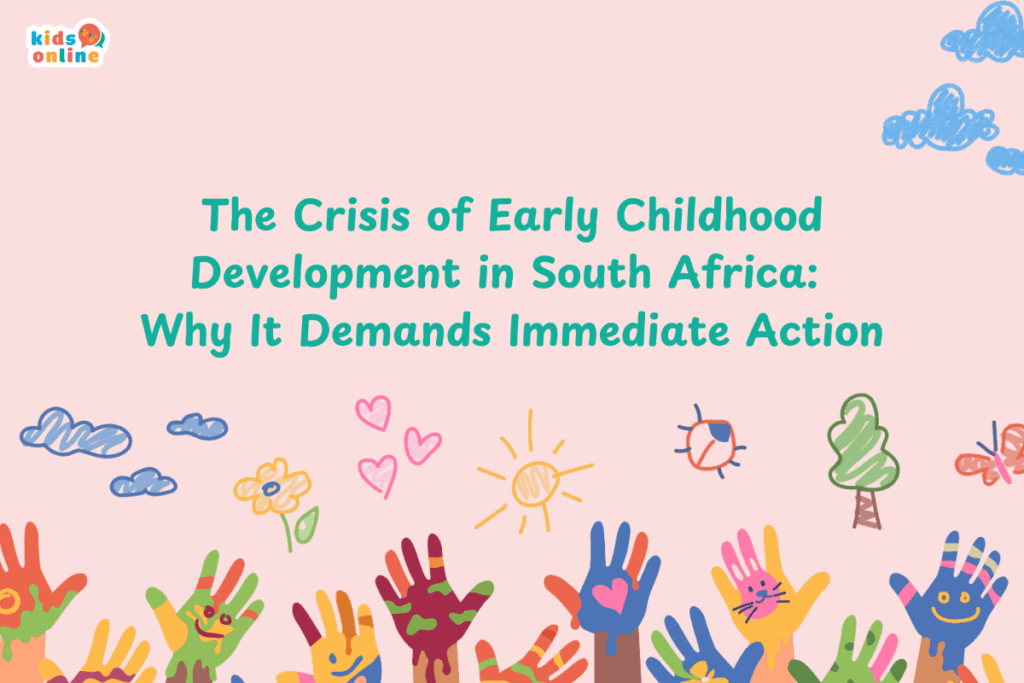Early childhood development (ECD) in South Africa faces a critical turning point. While millions of children would benefit from structured early learning, systemic gaps in access, quality, and regulation threaten to leave many behind. The findings from GrowECD and the 2021 ECD Census paint a stark picture that demands urgent response.
Enrollment and Decline Since the Pandemic
Before the COVID-19 pandemic, roughly 2 million children under six were enrolled in Early Learning Programmes (ELPs). Today, that number has shrunk to 1.6 million, meaning about 72% of young children are currently in ELPs. The decline suggests that many parents, facing financial hardship or misunderstanding the importance of early learning, have withdrawn their children from preschool.
Inequality at the Point of Entry
A child’s chances of starting school “on track” are heavily influenced by household income. Poorer children are significantly disadvantaged when they enter school, which sets the trajectory for their educational, social, and economic outcomes.
Key Statistics from the 2021 ECD Census
Number and Registration of ELPs
- South Africa has 42,420 Early Learning Programmes, with about 60% in urban areas and 40% in rural areas.
- Staff employed across these programmes total 198,361.
- Only 40% of centres are fully or conditionally registered; 16% are in the registration process; 42% remain unregistered.
- Around 33% of centres receive subsidy funding from the Department of Social Development (DSD).
Staff Qualifications
- 22% of ECD centre staff have no teaching qualification.
- 26% have attended some skills training programme.
- 52% hold a relevant qualification.
Fees, Infrastructure & Resources
- The average monthly fee charged is R509.
- On average, each centre enrolls 39 children.
- 86% of centres operate in formal structures, but 14% do not.
- 40% do not have flush toilets.
- 55% have running water inside the premises.
- 22% rely on bowls or buckets for handwashing.
- 34% lack an outdoor play area with suitable equipment.
- 44% don’t have age-appropriate books.
These deficits in infrastructure and educational materials severely hamper the ability of many centres to deliver engaging, developmentally appropriate programmes.

School Readiness & Developmental Risk
The Thrive by Five Index evaluates children aged 4-5 across critical domains—physical growth, motor coordination, early literacy, numeracy, and executive function. It reports alarming findings:
- 65% of children enrolled in ELPs fail to thrive by five, meaning they are not “on track” either cognitively or physically.
- Specifically in early learning tasks, only 45% are on track; 55% fall behind expected competencies.
- 49% of children are at risk (stunted growth or weak learning foundations), and 16% are at high risk—both in physical and cognitive development.
These numbers illustrate how many children enter primary school already disadvantaged.
Institutional and Systemic Reform
Shift from DSD to DBE
On 1 April 2022, responsibility for ECD was moved from the Department of Social Development (DSD) to the Department of Basic Education (DBE). This move aims to align early learning more closely with the education system, streamline operations, and improve quality oversight.
DBE’s Strategic Focus Areas
The DBE is pursuing five core strategies to improve ECD:
1. Curriculum-based early learning from birth to five years
2. Universal access to ECD programmes
3. Training and development for ECD practitioners
4. Coordination across ECD services
5. Flexible funding and provisioning frameworks
Barriers to Progress
- Unequal & delayed funding for centres
- Cumbersome registration processes-long, costly, and inaccessible for some centres
- Lack of recognition of ECD centres as small businesses, limiting access to financial instruments
- Municipal challenges (zoning, land use, service charges) obstruct formalisation
- Inadequate support for children with disabilities
- Children aged 3–4 entering mainstream schools, struggling to adapt to curriculum demands
What Must Be Done Next
To address the alarming state of ECD in South Africa, a coordinated, comprehensive response is essential:
- Improve access so that all children—regardless of background—can attend quality ECD programmes.
- Strengthen teacher capacity through formal qualification pathways, mentorship, and continuous professional development.
- About infrastructure & resources: upgrade facilities, provide learning materials and child-friendly equipment.
- Simplify registration & funding systems to reduce barriers for underserved centres.
- Ensure inclusion of children with disabilities across ECD provision.
- Leverage data & technology to monitor progress, support teachers, and enhance accountability.
South Africa’s children deserve a future built on strong beginnings. Without urgent, systemic changes, too many young lives risk falling through the cracks—losing potential before they even begin primary school.
>> Source: The alarming state of Early Childhood Development in South Africa








